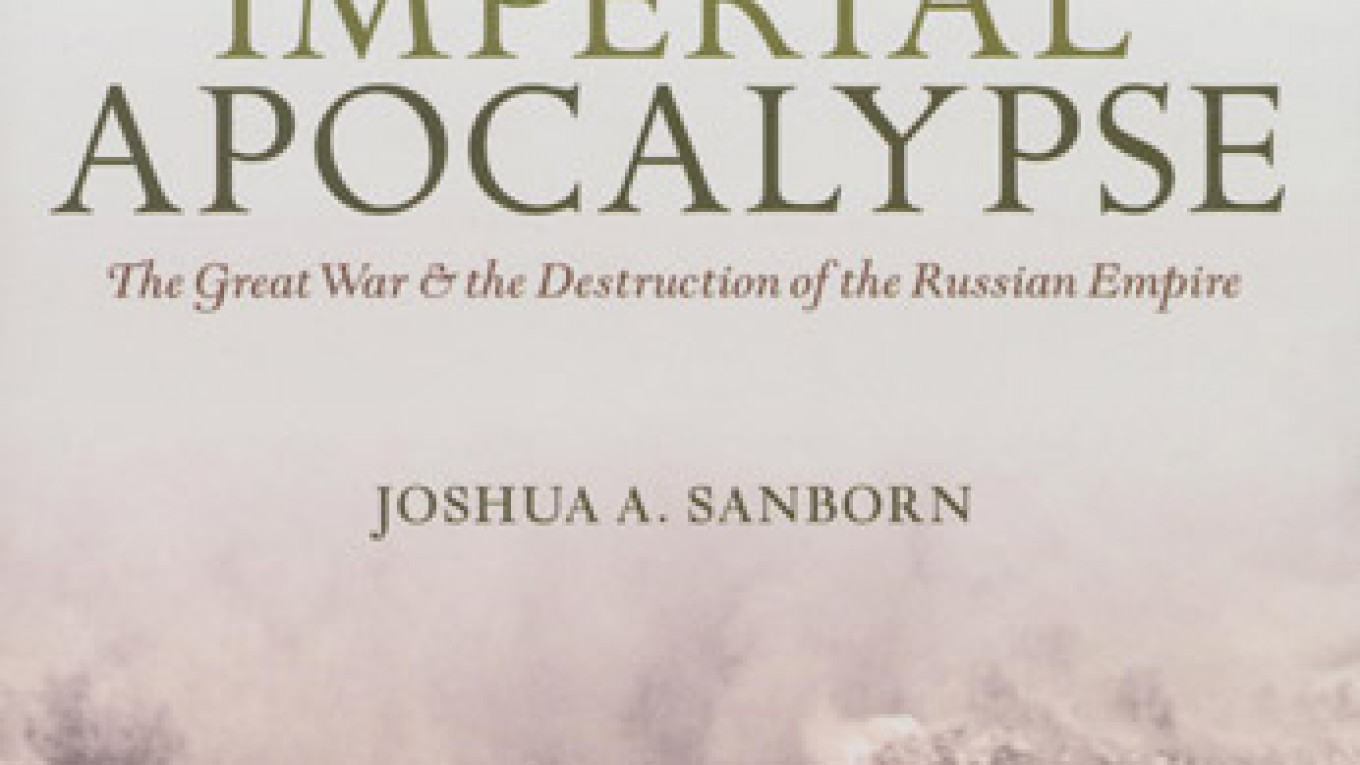In November 1914, the Russian-Jewish writer Semyon Ansky traveled to Galicia to see how the war had changed the region. Ansky — the pen name of Shloyme-Zanvl Rappoport — had heard rumors of atrocities being committed against the region's Jewish population and decided to investigate. When he arrived, Ansky uncovered horrific tales of murder, rape and other crimes. He also described the ways that the war unleashed certain forces that had not appeared before. Ansky would write about the chaos behind the lines, the deportations of suspected traitors, the looting and burning of towns, the refugee crisis that the war produced, and the seeming inability of the tsarist government to understand what the Great War had brought. What he discovered, of course, were the very processes that would lead to revolution.
Ansky and his account help inform Joshua Sanborn's remarkable new book about the Great War and the Russian Empire. In many ways, "Imperial Apocalypse" builds on the events that Ansky described and offers a fundamental new view of the Great War's significance. Sanborn, a history professor at Lafayette College in Pennsylvania, weaves together two big stories: the varied ways that the people of the Russian Empire experienced the war, particularly in the war zones, and the way the Russian Empire decolonized. Sanborn's history is not just one that examines how the Great War produced revolution, but how the Russian experience in the war marked the first example of decolonization.
To tell the story of imperial apocalypse, Sanborn argues that the process of decolonization unfolded in overlapping stages. First was what he terms the "imperial challenge" stage. The outbreak and early fighting of the war helped produce a host of challenges to the tsarist state. Sanborn describes how the war created new forms of politics and social interaction, how soldiers and civilians alike experienced the confusion produced after August 1914, and how the chaos of war produced ethnic tensions, including the Galicia that Ansky visited. The first months of the war, in short, deeply destabilized the borderlands: The war disrupted the economy, fueled ethnic hatreds, created a spy mania and radicalized populations.
The second stage, as Sanborn argues, is "state failure." By 1915 and the so-called Great Retreat from Galicia, imperial society itself was in deep crisis. The war had created enormous populations of refugees and deportees. The Russian government could not keep up with them: Between 3.3 and 6 million refugees fled the front lines. Added to this crisis, Sanborn notes, were the pogroms, rapes and armed robberies that spread across the war zones. Faced with these problems, Alexander Krivoshein would comment at an August 1915 Council of Ministers meeting that the migration of peoples "is dragging Russia into the abyss, into revolution and into destruction." His words would prove prophetic. The crises that gripped Russia by that time also included what Sanborn terms "the other military experience" of the war: namely, the unprecedented number of POWs as well as the enormous numbers of Russians mobilized to serve as doctors, nurses and other roles at the front. The result, Sanborn argues, was that "a new Russian society came into being," one that understood its wartime experiences in particular ways. The war gave birth to new citizens and, with them, a clearer sense that the state had failed them.
Sanborn notes that the war generated certain fears and an impending sense of doom that would characterize the revolutions of 1917. What followed was the "social disaster" phase. In its New Year's edition produced at the end of 1916, the newspaper Russkiye Vedomosti ominously noted that "there's no aspect of life that isn't a question," concluding that Russian life resembled a billiard game. By that point, heavy-handed tsarist policies had triggered revolts in Central Asia. Kazakh insurgents, reacting to conscription decrees and other onerous policies, launched attacks against Russian power. These sentiments soon spread to Petrograd, toppling the regime. The provisional government tried to recast the war and even launched another offensive led by General Alexei Brusilov, but, as Sanborn writes, the growing assertiveness of nationalist movements proved to be a greater problem. "From Crimea to Turkestan and from Chechnya to Estonia," Sanborn argues, the message from nationalist groups was the same: "no more empire, but federation rather than independence." The empire had come apart, in short, and the disasters that the war had brought contributed to the subsequent Civil War. Imperial lands now experienced decolonizing moments.
Ansky closed his account by lamenting the panicky retreat of the Russian army, the land soaked in blood that they left, the bloody pogroms still taking place, and the storm of revolution that now raged over the region, ensuring the horrible epic's continuation. From his perspective, it was hard to imagine a new system emerging. The final part of the decolonizing process, as Sanborn describes it, is the "state-building" stage. He does not delve into this stage in detail, noting that the topic deserves a separate study. He does, however, provocatively suggest that the Soviet Union might be best understood as a revolutionary, communist and postcolonial state that managed to be born out of imperial apocalypse even while reviving imperial ideas.
"Imperial Apocalypse" is an important book, full of insightful interpretations and telling details. Sanborn pays attention to people too: His pages include stories of farmers who have their cows stolen, prostitutes who are arrested for their front-line service, overwhelmed doctors responding to the horrific injuries of the war, mothers who learn about the deaths of sons, and young women who serve at the front (to name just a few). Using nine archives located in Russia, Ukraine, Latvia and the United States, Sanborn has written a book worthy of our attention during this centennial year of the Great War's outbreak.
Joshua Sanborn, "Imperial Apocalypse: The Great War and the Destruction of the Russian Empire" (NY: Oxford University Press, 2014).
Stephen M. Norris is a professor of history and assistant director of the Havighurst Center for Russian and Post-Soviet Studies at Miami University, Ohio.
A Message from The Moscow Times:
Dear readers,
We are facing unprecedented challenges. Russia's Prosecutor General's Office has designated The Moscow Times as an "undesirable" organization, criminalizing our work and putting our staff at risk of prosecution. This follows our earlier unjust labeling as a "foreign agent."
These actions are direct attempts to silence independent journalism in Russia. The authorities claim our work "discredits the decisions of the Russian leadership." We see things differently: we strive to provide accurate, unbiased reporting on Russia.
We, the journalists of The Moscow Times, refuse to be silenced. But to continue our work, we need your help.
Your support, no matter how small, makes a world of difference. If you can, please support us monthly starting from just $2. It's quick to set up, and every contribution makes a significant impact.
By supporting The Moscow Times, you're defending open, independent journalism in the face of repression. Thank you for standing with us.
Remind me later.






